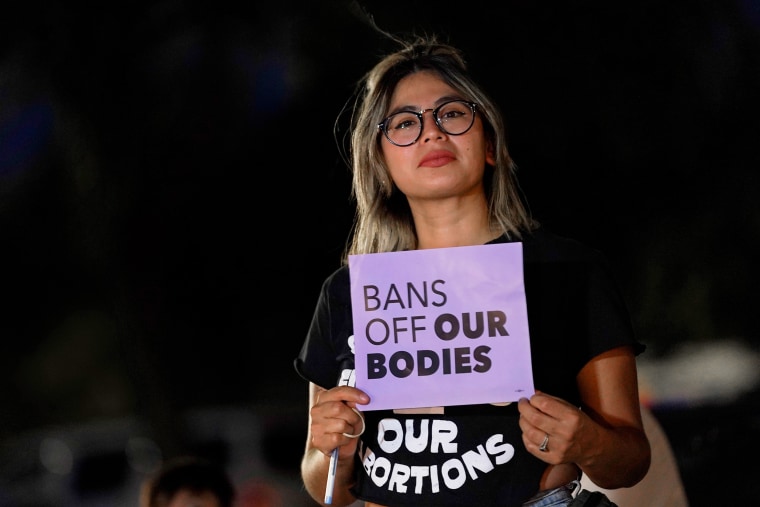The future of a 158-year-old near-total abortion ban still on the books in the political battleground of Arizona is now in the hands of the state Supreme Court, after justices heard opening arguments Tuesday in a suit challenging the restrictive law.
The outcome of the case will dictate which abortion ban the state must enforce: the ban enacted in 1864 — a half-century before Arizona even gained statehood — that would likely end almost all legal abortion care in the state, or a 2022 law that bans most abortion after the 15th week of pregnancy.
A ruling is expected early next year — a timeline that will dramatically highlight the already prominent role abortion rights will play in Arizona, as well as in other crucial battleground states, in the 2024 election.
Tuesday’s hearing represented another big moment in the continued transformation of a patchwork of divergent state laws that have governed abortion care in the U.S. in the 18 months since the U.S. Supreme Court struck down Roe v. Wade. It comes just one day after a Texas Supreme Court ruling in support of the state’s near-total abortion ban prompted a pregnant woman carrying a fetus with a fatal genetic anomaly to say that she would flee the state to have the procedure.
Inside a packed Phoenix courtroom, justices aggressively — but civilly — quizzed attorneys on both sides throughout the hour-long hearing. They focused frequently on questions surrounding the fact that the 15-week ban enacted last year did not feature any language making clear whether it was designed to repeal or replace the 1864 ban.
At stake in the case is the future of that Civl War-era law, which criminalized abortion by making it a felony punishable by two to five years in prison for anyone who performs or helps a woman obtain one. The law — which was codified again in 1901, and once again in 1913, after Arizona became a state — includes an exception to save the woman’s life.
A more recent law from March 2022 snapped into effect weeks after Roe was overturned banning abortions after 15 weeks of pregnancy. The law makes exceptions for medical emergencies but not for rape or incest.
The 1864 law was never repealed and an appellate court ruled last year that it could remain on the books as long as it was “harmonized” with the 2022 law, leading to substantial confusion in Arizona.
The state Supreme Court’s decision could resolve those questions — at least for a short time.
An abortion-rights group called Arizona for Abortion Access is seeking to put a proposed constitutional amendment on the November 2024 ballot that would create a “fundamental right” to receive abortion care up until fetal viability, or about the 24th week of pregnancy.
The measure would, after that point of a pregnancy, bar the state from restricting abortion care in situations where the health or life of the pregnant person is at risk, according to the treating health care professional.
The ballot effort is one of at least nine across the country that seek to put the issue directly in the hands of voters — a move that has the potential to significantly boost turnout for Democratic candidates emphasizing the issue. In 2024, that could factor heavily into the outcome of both the presidential and U.S. Senate races in Arizona.
If the measure were to pass, it would effectively undo both the 1864 and 2022 abortion restrictions currently in place in the state. Supporters, however, must first gather about 384,000 valid signatures from registered voters in the state by July 3 to get the measure placed — a goal organizers are optimistic about meeting.
The case over the 1864 law could also end in a split decision.
While all seven justices on the Arizona Supreme Court were appointed by Republican governors, only six justices will rule on the case, after Justice Bill Montgomery — who has previously accused Planned Parenthood of practicing “generational genocide” — recused himself.
The court’s chief justice did not appoint another judge to take the spot — an option under Arizona law — meaning that the ruling could possibly come down as a 3-3 split decision. If that occurred, a lower court’s ruling that the 15-week ban superseded the 1864 law would stand.
That ruling, by the state appellate court, put on hold large parts of the 1864 law, but also stated that the two laws could be “harmonized.” The judges on that court said that meant the penalties in the 1864 law could remain in effect, but could only apply to unlicensed nonphysicians.
The abortion landscape in Arizona has been uniquely confusing since Roe v. Wade was overturned.
While the 1864 law had been on hold after the Supreme Court’s 1973 Roe decision, then-Arizona Attorney General Mark Brnovich, a Republican, successfully sued to have that injunction lifted following the overturning of Roe, putting the 158-year-old ban back into effect — though a higher court put that ruling on hold.
But after Democrat Kris Mayes succeeded Brnovich as attorney general in November 2022, she announced that she would not enforce the 1864 ban.
That led to suits from anti-abortion groups seeking enforcement of the ban, which ultimately led to the case making its way up to the state Supreme Court.

